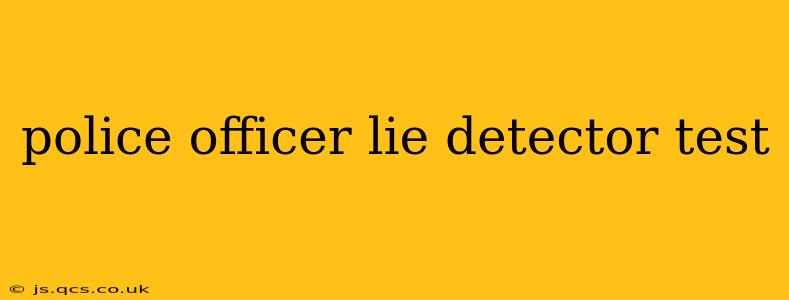Lie detector tests, formally known as polygraph examinations, are a complex and often controversial topic, especially when it comes to law enforcement. While frequently depicted in movies and television, their use in police investigations and internal affairs is far more nuanced than popular culture suggests. This article delves into the accuracy, legality, and implications of police officer lie detector tests.
How Accurate Are Lie Detector Tests for Police Officers?
The accuracy of polygraph tests is a hotly debated subject. While proponents claim high accuracy rates, studies have shown mixed results, and many experts question their reliability. The test measures physiological responses like heart rate, blood pressure, and perspiration, which are then interpreted as indicators of deception. However, these responses can be influenced by factors other than lying, such as anxiety, nervousness, or even medical conditions. This means a truthful officer might fail the test due to stress, while a deceptive officer might skillfully mask their responses. There's no universally accepted standard for interpreting polygraph results, leading to inconsistencies and potential bias. The American Psychological Association (APA) does not endorse the use of polygraphs for detecting deception due to their inherent limitations.
Are Lie Detector Tests Admissible in Court Against Police Officers?
Generally, the results of polygraph tests are not admissible as evidence in court in most jurisdictions. This is because they're considered unreliable and potentially prejudicial to the jury. The scientific community's lack of consensus on the accuracy of polygraphs significantly contributes to their inadmissibility. While a confession obtained after a polygraph test might be admissible (depending on the circumstances and whether it was coerced), the polygraph results themselves generally aren't. The legal landscape concerning polygraph evidence is complex and varies by state and jurisdiction.
Can a Police Department Force an Officer to Take a Lie Detector Test?
This depends heavily on the specific circumstances, department policies, and applicable labor laws. In many cases, a police department can request an officer to take a polygraph, particularly during internal investigations. However, forcing an officer to undergo a polygraph test against their will could be a violation of their rights. The officer might be subject to disciplinary action for refusing, but compelling them to take the test could face legal challenges depending on their union contract and the specific context. The use of coercion during the testing process can also compromise the admissibility of any subsequent statements.
What Happens if a Police Officer Refuses a Lie Detector Test?
Refusal to take a polygraph test can be seen as an indicator of guilt by some, but it's not definitive proof. The department's internal affairs division will likely weigh the refusal alongside other evidence gathered during the investigation. The consequences of refusal can range from a reprimand to suspension or even termination, depending on the severity of the alleged misconduct and the department's policies. It's crucial for officers to understand their rights and to seek legal counsel if they're facing pressure to participate in a polygraph examination.
How Are Lie Detector Tests Used in Police Internal Affairs Investigations?
Polygraph tests are sometimes used in internal affairs investigations as one tool among many. They're often employed to narrow down suspects, gain information, or encourage confessions. However, their use is frequently accompanied by other investigative methods such as witness interviews, forensic evidence analysis, and document review. It is important to note that the results of a polygraph test are rarely the sole basis for disciplinary action or criminal charges.
What Rights Does a Police Officer Have During a Lie Detector Test?
Police officers have the right to legal representation during an internal affairs investigation and before submitting to a polygraph. They have the right to remain silent and should be fully informed of the purpose and potential implications of the test. It's crucial for officers to carefully consider the advice of their legal counsel before agreeing to undergo a polygraph examination.
In conclusion, the role of lie detector tests in police investigations is multifaceted and subject to considerable legal and ethical debate. While they might offer some investigative value, their limitations and potential for misuse necessitate caution and careful consideration of legal rights. The information presented here is for informational purposes only and should not be considered legal advice. Always consult with a legal professional for guidance on specific situations.
